#OKAY BUT THIS HAS SOME HISTORICAL VALIDATION
Text
Hmm… Cornish Western story… hm
#OKAY BUT THIS HAS SOME HISTORICAL VALIDATION#bc okay. in the 1830s there was this MASSIVE Cornish emigration#Cornish tin and copper was drying up and the mining business overall in the uk was coming to its heat death#so boom. no more work for a VAST MAJORITY of Cornish folk#so a lot went to South and Cebtral America and a lot went into the US west and Midwest#because westward expansion was also happening (fuck) and so hey#there’s more work out west and in the Americas#just grass valley Cal. was 3/4 Cornish by descent by 1911#so there was a huge Cornish diaspora group in the American west#there were tons of places labelled as “’little Cornwalls’ all throughout the west#and in mexico too!! real de monte!#that’s the only place I can think of atm that retained the status#now clearly there’s way more nuance to it and a far more complex history#especially when talking abt Manifest Destiny and the suchlike#ik that Cornish miners were being PAID to leave Cornwall for Australia to work but I can’t find anything about anything like that happening#re: immigration to america. it’s an incredibly fascinating history bc it did help out the Cornish economy in ways#still quite a few men went over and sent money back to their families#but anyways. to bastardise an entire period in history#cornish western#(multigenerational story? classic revenge ie escaping a past?)#I should be banned from thinking I don’t do anything good with this ability#its actually an idea I’ve had for a while but only in vague shapes#I just think Cornwall is pretty and I’m deep in its history. I also think the American west is pretty and I’m fascinated by ITS history#kicking a tin can around in my brain with my hands in my pockets#anyways
5 notes
·
View notes
Text
Do you remember that Aussie sword guy who used to talk about medieval weapons?
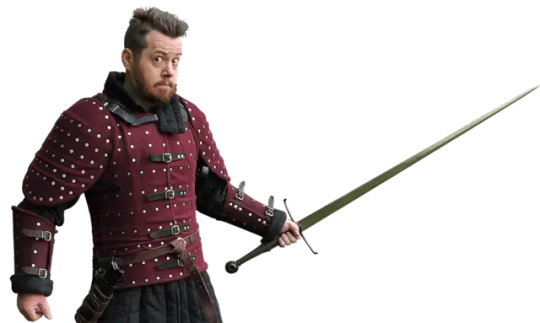
And, like, he seemed pretty good at talking about swords and shit. He seemed to have a good grasp of the history and tactics. He'd analyze movie weapons for their realism and that was fun. He did demonstrations with real weapons. For a time I really looked forward to his videos popping up in my feed.
He seemed like a harmless sword-fighting aficionado.
But then I guess he wanted to spread his wings. So he started down an anti-woke path. Giving questionable critiques about media and feminism. He started defending boob armor by showing historical examples even though most of those were decorative and not battle ready like in the games.


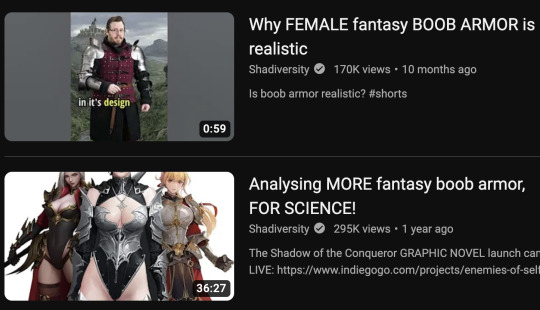
Then he admitted he was a fan of The Daily Wire.

And that was disappointing.
I missed him nerding out about swords, ya know?
Well, Shad decided to spread his wings again.
He has become...
*bad French accent* An artiste.
You see, he types words into a little box. Then a little robot does a google image search and steals a bunch of art. Then that robot reconfigures that art to be nearly indistinguishable from the source material. Well... aside from the occasional artist watermark.

Whoops!
A.I. art is very difficult. Sometimes when you type words into the box you get a woman with 5 lopsided anime tiddies. Or 20 fingers on one hand. It takes time and effort and experience to type in the perfect magic words so that you get something close to your imagination that doesn't belong in some sort of Lovecraftian horror ripoff.
For example, check out this cool "pirate hat" I asked A.I. to place on my head.

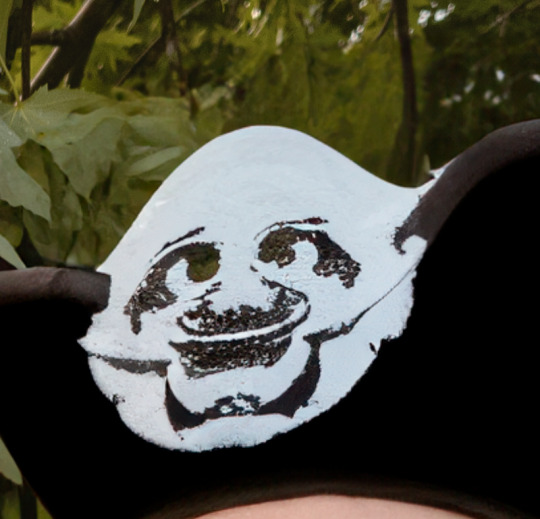
Clearly, I am not skilled enough at typing words into a box to get a proper pirate hat.
It. Is. Not. Easy.
I heard someone say you have to type things in a box for 10,000 hours before you start getting truly masterful generations.
I mean, you can't type "marathon runners" and expect that to actually work.

THIS REQUIRES SKILL, PEOPLE.
And I am a lowly amateur. I can only dream of becoming the box-typist Shad has honed himself into.
The thing is... Shad is very upset.
He is upset that you don't like his "art" and he is ready to die on this hill.
So... before he croaks on a mound of bullshit, he has something to show you. He has created something truly brilliant and when you see it, he is convinced you will validate his considerable efforts.
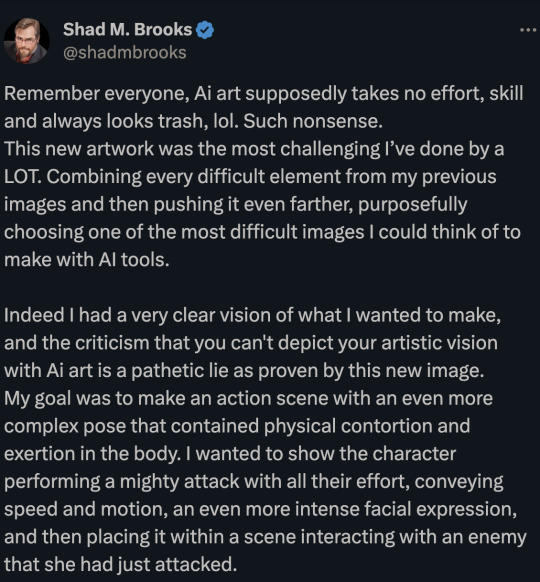
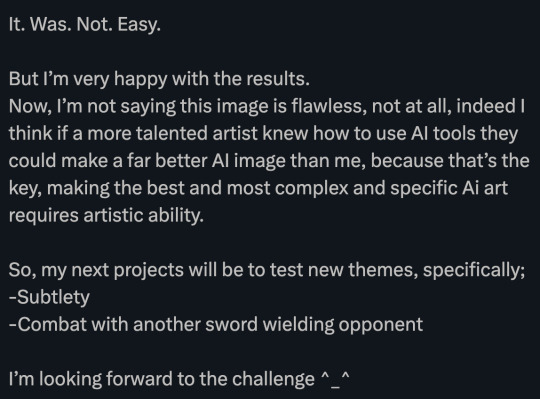
Before I show you his "Not. Easy." artistic masterpiece I'd like you to sit with what he has said for a second.
Ruminate in the verbiage.
Process the ideas and points of view presented.
Digest his plea for you to accept and love his hard won battle after typing words into a box to manifest his imaginings.
.
.
.
.
.
.
.
.
Have you sat?
Ruminated?
Processed?
Digested?
Okay, here it is...
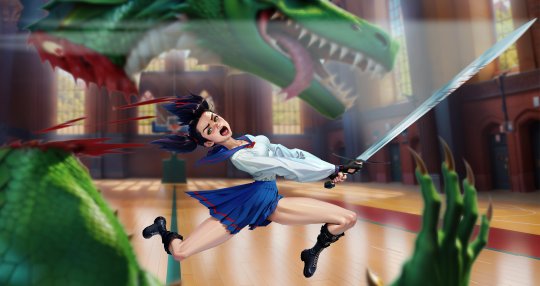
7K notes
·
View notes
Text
I have not posted on this Tumblr in a thousand years (okay like seven but in internet time that is a millennium) but I took a year off from allll social media and coming back to all these changes on instagram and completely new platforms (I don't know what threads is and at this point I'm too afraid to ask) has made me yearn for the simplicity of Tumblr.
So I'm back. I'm not sure how often I'll post but maybe it will help revive my love of sharing progress of my projects, which is faded thanks to how discouraging the meta algorithms can be.
I feel like the likelihood of any of my followers still being active is slim at best (how are there still 60k people following this blog, really?) but maybe I can find some new ones while I share my new works.
In case you're like, "who is this bitch in my feed" -- I'm Angela, I make historical/fantasy costumes wish varying amounts of success, and I like both talking about the process and seeking validation on the internet. 🥰
396 notes
·
View notes
Text
I'm sorry, but actually I'm not over that comment whining about how several of the JVP ritual, uh, practices and bastardization of Judaism are being excluded and how we can't police people's identities.
Actually yes we absolutely can.
[Rant incoming]
Listen, I hate exclusion, alright? Inclusion is always the answer when it comes to people knowing who they are. Every obnoxious identity policing thing in the queer community that has divided us and ripped apart communities has been cruel, counterproductive, given platform to bigots, a distraction from the real issues bearing down on us, and honestly just dumb as a box of rocks. Okay? Okay.
But Jewish identity works differently, because it isn't about YOU. Becoming Jewish is about taking on Jewish culture and religion, a closed ethnoreligious culture, through the narrow path consented to by the collective Jewish people. There IS a path, but it is a highly supervised one. Otherwise it's just appropriation and cultural theft; something Jews have been subjected to for millennia. And if you do legitimately convert you do so because you love the Jewish people - the whole Jewish people - and want passionately to be a Jew for its own sake. You want to join our nation-tribe. You want to join our family.
And the crazy thing to me, the thing that still blows my mind, is that this is allowed! Even after millennia of appropriation, oppression, violence, expulsions, and genocides, Am Yisrael still accepts genuine gerim. It would be so understandable if they had closed the path entirely and tried to shut out outsiders who might bring in danger on their heels even if they themselves were not dangerous.
But they didn't. We didn't. To me this is a miracle, a blessing, and sign of true faith and hope. It is a privilege to be here.
Yet in the same turn, you gotta respect the process! You can't just declare yourself a Jew simply because you feel like it — it doesn't work like that. You can't just declare yourself an Argentinian one morning either without becoming a citizen first, even if you have Argentinian ancestry. And sure, if you do have some of that ancestry, you are connected to the nation, but that's different from being given a vote y'know?
Using a totally unsupervised, totally unsanctioned, brand-new neo-pagan ritual to unilaterally declare your membership in a tribe does not make you one of us. If anything, it proves why you never will be.
Now! Let's assume for a moment that we are referring only to the provably halachic Jews whose connection and backgrounds are beyond reasonable questioning.
You can never really leave the tribe, but you absolutely can apostasize. Plenty of Jews do it. There are plenty of Jews who find that Judaism is not spiritually fulfilling for them but something else is, and they convert out. There are halachic Jews who have walked away from Judaism in order to practice any other number of religions: Christianity, Islam, Neo-paganism, Hinduism, etc.
That is their prerogative, but by doing so they turn away from their people in a serious way and cannot be said to be practicing Judaism. There is of course room for many different types of Jewish practice, but conversely, there are practices that are too far removed from Judaism to meaningfully be considered as such. Otherwise, it's no longer a coherent group identity. And because Judaism is a collective identity, that actually matters.
The Jews as a people have decided that worshipping gods that are not Hashem is not within the realm of Judaism, which is why messianic "Jews" are not practicing a valid form of Judaism even if they are halachicly Jewish and/or have Jewish ancestry. Worshipping Jesus makes you a Christian or at least adjacent. That is a hard boundary.
And yeah — if you change the basic meaning of holidays, if you bring in lots of practices that are brand new and have no halachic or even historical basis, are often highly individualistic, and would not be accepted as Judaism by the vast majority of Jews, then it absolutely falls outside it. If I started practicing a religion that made little icons of Muhammad to pray to once a day and celebrated my ingenuity with pork roast and a nice glass of wine, I don't get to say that I'm practicing Islam.
These people are doing the Jewish equivalent. It is something else entirely. Especially because so many of these practices spit in the face of major tenets of Judaism and go against Jewish values.
To treat it otherwise is to treat it as an absolutely meaningless aesthetic rather than a living breathing ethnoreligious tribe of people who get to decide our own community's boundaries and practices collectively.
And for the naysayers who still disrespect Judaism and Jewish identity and peoplehood so much that they think that they get to define Judaism more than actual rabbis? Look, we can't physically stop you from calling yourself Jewish, but by the same turn, YOU can't force US to recognize you as one of us. You can be mad, but that's the thing about group cultural identities — that cultural group gets to decide whether they claim you or not.
[To be clear: this is not about politics — there are plenty of Jewish non-Zionists and anti-Zionists who are 100% Jewish. This is about this one specific shitty organization and this particular type of behavior.]
321 notes
·
View notes
Text
Oh boy. Okay. Here we go
A totes calm and measured response to this post over here by @themetabridge. Forgiveness for the whole new post. I had too much to say to fit into what Tumblr apparently thinks is an appropriate length for a re-blog.
First? I mean. Text just means the words and actions as they are said and shown in a given piece of media being analyzed. Which is what I’m here to do with my meta – textual analysis. That’s why I insist on textual support for any argument interpreting the media in question. Naked assertions do nothing to explain how you arrived at your conclusion. Vibes aren’t good enough. Show me what IN THE TEXT made you think what you think, and I will do you the courtesy of the same. Otherwise, I don’t see how we could possibly have much to say to one another.
The fundamental breakdown we are having is that you have failed to provide a textual basis for why you think Ed is a bad person. While I respect your assertion that a person’s essential goodness is predicated on the actions that they perform, I cannot respect the corollary supposition that there are actions that are either “good” or “bad” in a vacuum, as this completely ignores circumstance and motivation. WHY someone does something is AT LEAST as important as WHAT they did.
For example - Stede killed Ned Lowe in cold blood. Does it matter that he did it because Ned “shit-talked [his] friend and damaged [his] ship,” and “fucked Calypso’s birthday”? Does it matter that Ed, the person whom Ned’s shit-talk actually impacted, told Stede not to do it? Twice? Does it matter that Ned was a subdued enemy combatant, and as such could have just as easily been gagged like Hornberry and the overtly racist Wellington, who survived imprisonment and went on to watch Ed and Stede sign the Act of Grace? Do we compare Ned to the French Captain who got flayed for his racist rhetoric, though Ned’s comment was, strictly speaking, about Ed’s class rather than his race? How far are we going to go to disentangle class and race when one absolutely informs the other?
How about a more straight-forward example; Stede set an unnamed man on fire and quipped about it like some asshole 80's action hero. Does it matter that he threatened Stede’s life? How about if, when he did so, he was twenty feet away, armed only with the bottle he had just broken over his head, and there were half-a dozen pirates between him and Stede who all thought Stede was hot shit, and so Stede was in no immediate danger? What if Stede has a long history of people making attempts on his life, and being unsure that he even deserves to live, and this is meant to show that, now that he has something to live for, he’s done with the part of his life where he lets anyone try to take that away from him?
This is what I mean when I say that the show is careful to never outright condemn the use of violence. The narrative tells us clearly that, within the context of the show, some things are more important than an unnamed or one-off character’s life – preservation of one’s own life or the lives of one’s loved ones, dignity in the face of racially-based persecution, resistance to colonial oppressors. The reasons for and direction of violence matters. Context matters.
And speaking of context, you misunderstand me when you suppose that only what literally appears before our eyes counts can be “read into the text”. I refuse to give extra-textual sources of information (such as the historical reality of sergeant recruiters and being pressed into service or the historical Golden Age of Piracy) any weight unless they can be validated by in-text support, because the show itself cares fuck-all about historical accuracy. But extrapolations about the in-show universe based on in-text support are fine.
So, considering that the very first thing we hear in the show is Frenchie’s little ditty about the violent reality of a pirate’s life, and considering Jack’s comment at brekkie about how pirating is an "ugly profession”, and considering what we see of the raids in 1x5 and 2x2, we can reasonably conclude that pirate culture is steeped in toxic masculinity where the expectation of performing violence is de rigueur. Because Ed has carved out a successful reputation as Blackbeard, and because we see the ease with which he can go from being casually conversant with Stede to “giving it some oomph” to scare the location of the treasure out of the French captain in 1x5 with the THREAT of violence, we can reasonably conclude that he can successfully perform the required violent displays of piratical society (or at least, given that we know by his bathtub confession that he has not personally killed anyone since his father, he can adopt a convincing enough posturing that no one would doubt he COULD). From his interactions with Jack and familiarity with “yardies” and “whippies”, and his ruminations about “the old days” of “drinking all day and biting the heads off turtles or making some poor bloke eat his own toes for a laugh”, and Fang’s assertion that Ed made him kill his dog, we can reasonably assume that Ed has a history with casual violence for the sake of fun and cruelty for cruelty’s sake.
However.
I think “the old days” is an important qualifier there. Season 1 Izzy may be frustrated that Ed is not performing Blackbeard sufficiently well to suit him (on that point we can agree), but even by his own deathbed confession “for YEARS I egged [him] on, even though I knew [Ed] had outgrown [the Blackbeard persona]” (emphasis mine, and pin in that for a moment). In 2x1, Fang is crying into his cake saying “I’ve never seen Blackbeard like this” - indicating that the conditions of the Kraken era are NOT the norm. The slivers of Ed we see in 1x3 before the Spanish raid are marked by him speaking calmly and rationally to Izzy (in stark contradiction to Izzy’s insistence that he’s half-mad) never even raising his voice much less using threats or any actual violence to get Izzy to do what he wants. In fact, it is Izzy who suggests a course of action involving very normative piratical violence (“Do we open fire? Or would you rather we just attack them, kill them, throw them out to the sharks, sir?”), which Ed counters with a genteel proposition - inviting (not even ordering!) Stede aboard for a face-to-face meeting. Izzy being comfortable enough to push back against orders (“Oh, Edward, can’t I just send the boys?”) even suggests that he feels no threat from Ed at all. Every indication is that by the time we meet Ed, well before he ever meets Stede, he’s already well past done with violence for violence sake.
When Ed does meet with Stede, before he’d fallen in love (Even though the are the U-Hauliest, I would argue “fascination” with a possible side of “infatuation”, but certainly not yet love), one of the early conversations they have is about the depiction of Blackbeard in Stede’s book of pirates. Ed expresses revulsion and anger that the persona that he’s worked so hard to cultivate has been twisted into a hyper-violent parody - a “Vampire Viking Clown” that’s barely even human, with a head of smoke and overladen with weapons and hardly bears any resemblance to the real man. We’re meant to understand that this is not a valid or accurate representation of who he is. Violence is a normative part of pirate life, but he has “one knife, and one gun JUST LIKE EVERYBODY ELSE” (emphasis mine, again) - he doesn’t shirk from using the tools of violence when it’s necessary, but he is NOT excessively or wantonly violent.
And we SEE the evidence of this because of how Stede reacts to the way Ed acts around Jack. Jack keeps Ed drunk all day, decoupling his inhibitions from his decision-making processes and, in spite of Ed explicitly saying that he’s mellowed out, Jack eggs him into the kind of hyper-violent Jackassery that is excessive even for pirate society if the nervous reactions of Stede’s crew are any indication. Of course, this is all part of Jack’s plan - to manipulate both Ed and Stede and force them apart - and the reason that it works is because the way Ed acts around Jack is NOT the way he chooses to act under his own volition, hence Stede’s frustration and disappointment.
While I agree that piratical violence is not political praxis, I would argue that, considering that every raid we have witnessed Ed participate in has been against a representative of colonial power and, more often than not, specifically the enforcing arm thereof, it’s not unfair to conclude that Ed’s reasoning goes that if piratical violence is to be done, better against someone who deserves it than not - i.e. those who perpetuate the violence of colonialism. Regarding instances of violence outside the context of raids, here’s where we take that pin out of Izzy.
Izzy and Ed are locked in a cycle of abuse over the first season, wherein Izzy decides that Ed is not Blackbearding hard enough, and, because he feels entitled to controlling Ed’s actions, bullies and harasses him into capitulating - typically in the form of performing violence. Afterwards, Izzy performs some form of deference - apologizing and/or acting as though he’s going to leave, which Ed “talks him down from” and mercifully allows him to stay. It’s why, when Ed sees Izzy packing up a dinghy (lol. With what? It’s not like he’s on his own ship or would have brought his things with him, or sacked plunder from the Revenge. Clearly he was just stalling until Ed noticed him and swooped in to do his part of the cycle) he tells Stede he “should deal with this,” as though it’s tedious, but normal occurrence. I think an important part of this cycle as the season progresses, though, is how Izzy keeps upping the stakes.
So by the time we get to the end of the season, when the last iteration of the cycle starts up again (when Ed is once more insufficiently Blackbearding by being emotionally vulnerable and open with the crew following his return to the Revenge and his stint in the pillow fort (note that Izzy is apparently FINE with Ed not being Peak Pirate, just as long as he hides it away from everyone), and Izzy once more bullies and threatens Ed) this time it is especially cruel - Izzy is a thumb in the wound, attacking Ed at his most vulnerable and saying it would be better if Ed was DEAD than “pining for his boyfriend.” This iteration now also brings with it a history of escalation (first in Izzy bringing Fang and Ivan in to force Ed's hand about killing Stede, lest he look "weakened by the love of a pet" before his crew, and therefore in danger of mutiny, and then by bringing in the British Navy to force Ed to take Izzy back - or rather, to force Izzy back into Ed's life because the terms of the agreement see Ed remanded into Izzy's custody as though he is property to be distributed at the will of the Brits) - an established pattern of the lengths to which Izzy will go to get what he wants, and so a very real threat implicit in Izzy’s warning that “Ed had better watch his step” as Izzy serves only Blackbeard. So Ed gives him what he wants. He Blackbeards it up just like Izzy insisted, and lets Izzy know in no uncertain terms that the insubordination is done. It’s not a "frat boy prank" when he cuts off Izzy’s toe and feeds it to him, or even something from which he's deriving pleasure as he might have in the old days; it’s a calculated, proportional response, done under duress and against his own inclinations, but exactly the tool required to get the message across clearly.
As to the question of why it matters if Ed is bad, first and foremost, because saying that he is bad requires you to explicitly read contrary to the text. If you’re not going to engage with the text on its own terms, I don’t see how you can do any analysis of what story it’s trying to tell. I already discussed the ways in which the narrative is specifically about how Ed is NOT bad, even when he himself thinks he is. I have also discussed how, while “violence is never the answer” may be broadly understood to be the correct way of comporting oneself in real life, the show never condemns violence across the board. The show condemns cruelty, both on an interpersonal and societal level, but positions the use of violence as an acceptable and reasonable response thereunto. It treats circumstance and motivation with nuance and weight. Living within this context, Ed’s use of violence by the time we meet him is well within the normative acceptable application thereof. Judging him by standards outside the context of the story within which he exists makes as much sense as judging the Stede from the show for being a slave owner because that’s historical fact - that’s just not applicable to who he is in THIS story.
But more importantly, it matters because Ed is a POC character. Describing him as “cruel and perverse” for utilizing violence, particularly when the violence he uses is NOT excessive or impulsive, perpetuates negative race-based stereotypes about hyper-violent men of color. Characterizing him as “bad” for his use of violence when other (white) characters, such as Stede, use violence in similar ways, or are cruel or petty, but can still be considered, on balance, “good” means that Ed is being held to a different, higher standard than those white characters, and perpetuates the frankly racist criteria of expecting POC exceptionalism for POCs to be considered for the base-line assumptions of acceptability that are afforded to their white counterparts. Saying that Stede’s love is what changed Ed’s behavior from cruelty to wholesale abandoning piratical principles is not only antithetical to what actually happens in the show, but suggests a read that POC Ed needs a good white man to show him how to behave, a real white knight to tame his savage heart. That’s some real White Man’s Burden shit there, bro. I highly recommend you put it down.
#Brevity? I don't know her#ofmd#our flag means death#my modest contribution to fandom#crew4life#permanent ink
71 notes
·
View notes
Note
Can I request a further rant on Alice Albinia's The Britannias please?
Anonymous asked: 'Further rant available upon request' here is my official request.
Aha. You are both prompt and accommodating. And it is my lunch break, so let's do this!
For context, this is the book in question:
This book was recently published, comes highly reviewed and (as I said) has apparently already been longlisted for some prestigious nonfiction writing/women's prizes. I got it from the library the other day and started reading it; I'm about 150 pages in. It has given me an increasing Itch to the point where lo, yes, here I am on Tumblr about to compose a Statement. This may be because of what the book blurb states upfront as its focus and goals:
Trespassing into the past to understand the present, The Britannias uncovers an enduring and subversive mythology of islands ruled by women. Albinia finds female independence woven through Roman colonial reports and Welsh medieval poetry, Restoration utopias and island folk songs. These neglected epics offer fierce feminist countercurrents to mainstream narratives of British identity and shed new light on women's status in the body politic today.
Okay... well. Basically, she wants to write a history of Britain as focused on its islands, which in itself is a perfectly valid thing to do. As she states in the introduction, focusing on the history of a place through its physically and geographically marginalized locations, its relation to the "mainland," the constructions of power and identity, how one resists and influences the other, is all a very interesting thing to do. It's just how she does it that gives me a twitch. Her clearly stated goal is to find a "hidden women's history" wherein these "fierce feminist countercurrents" are allowed to inform and eventually subvert a totally androcentric and oblivious mainstream British history that has apparently prevailed largely unchallenged ever since antiquity, and where the Male Process of History deliberately destroyed and excluded all female contributions. She is somehow, apparently, the first one to notice this and/or put it together.
Now I'll be honest, the Secret Magical Women trope also gives me a twitch wherever it appears, whether in saccharinely self-important historical or fantasy-historical fiction or in this case, attempted historical nonfiction. Albinia's thesis also seems, essentially, directly lifted from Marion Zimmer Bradley's Mists of Avalon fantasy series in the 1980s: the pagan Celtic/British tribes were egalitarian, proto-democratic, female-led and/or female-centric, and the conquering Romans/Christians/Saxons were all virulently misogynist, masculine, authoritarian, and determined to stamp out this wherever it appeared. I have only gotten up to about the year 1000 (it goes chronologically), so I can't speak to what rationales Albinia comes up with for the later centuries, but let me just say: Hmm. It says a lot about the overall style of this book that I read the first 10 pages and then immediately picked up my phone to check Wikipedia and see if she was a TERF. As far as I can tell, fortunately, she isn't, but it does give me the same binary gender-essentialist vibe (men are from Mars, women are from Venus), and yikes. Basically, there are a lot of things going on here, and all of them are Not Good when it comes to the actual practice and investigation of premodern women's history:
First, while Albinia cites a few research articles (via endnotes) and translations of primary sources (thus far, mostly Roman and early medieval) we know nothing about her qualifications for using these sources, how she is comparing and analyzing them, whether they should in fact be taken at face value, whether anyone else has written on these topics (spoiler alert: yes), or why we are supposed to buy her narrative of this Hidden Female History of Britain. For example: she includes several passages from Roman writers discussing (reported) actions or (reported) mythologies of British women or British female-associated places. These are presented as uncritical and general fact, or something which we should apparently assume was really happening as described, even when she (occasionally, and shallowly) points to the issue of using exterior and non-contemporary male writers from far away. Her analysis also does not touch at all on the potential metatextual or political impulses these Roman male writers might have for presenting a freshly conquered imperial territory as corruptly or unacceptably feminine, and whether this correlated at all to an overall real-world practice or belief. Yes, as far as we can tell, the ancient Celts were in some ways more "feminist" than the Romans, in that Roman public culture was deliberately and exclusively masculine and patriarchal and any civic participation by women in other societies would thus appear as more than usual. But that is a whole can of worms for many reasons, none of which are highlighted or dealt with here. (Like... are we even going to talk about how the "Roman standard" for society was itself re-created by the Renaissance and how that shapes Western historical views, or...?)
As I said above, the book completely brushes aside any of the previous existing scholarship on these topics (done, you know, by actual historians) and presents it as Albinia discovering these issues or formulating these arguments for the first time. She does mention a few other people whose work she relies on or who are informing her hypothesis, but several times thus far, this is from the 1920s or some other clearly outdated argument. Nobody in the field is still treating arguments made in the 1920s as au courant, and while I can't say for certain, it reads as her being more able to access older or public-domain work (since more up-to-date publications require institutional access or paying for copies) and doing the equivalent of the people on Wikipedia who cite the 1911 Catholic Encyclopedia for everything: they can get that text for free, so that's what they refer to. Now obviously, we all support uncovering feminist strands of history, doing feminist history, challenging heteronormative or patriarchal narratives, etc. But also, we support doing it well and making some reference to the complexity of it!!!!
Likewise, Albinia is a white British woman whose previous books are based on her time living and traveling in India and Pakistan (both of which are, uh, previously British colonies). I have not read them, so I can't speak to how she treats it, but there's certainly an element of exoticizing them here, and while she does make passing reference to the British Empire's effect on those places, she does a sort of weird inverse here. She obviously knows about the basic facts of empire and colonization, but there's a notable amount of time dedicated to portraying ancient/Celtic Britain as the helpless victim of constantly brutal Roman colonization (she makes a few very brief and offhand references to cultural miscegenation and how this process unfolded in ways apart from violence, but they are clearly secondary to her main thesis of this as a masculine rape analogy). She is very clear about mourning for this "sacred divine [female] Britain" which was then destroyed by the unrelentingly violent and misogynist forces of Roman (cultural/military) and Christian (religious) colonization, and as I said, that is straight up Marion Zimmer Bradley. I haven't gotten past said first 150 pages, but I'm not terribly confident that her historical analysis improves much in the centuries to follow.
The book does have some bright spots: it's well written, it's engaging, she includes some colorful and interesting sociological vignettes about life on the margins of modern Britain, and there are certainly some things she's mentioned that I would like to look into in more depth. But yet again, this is being presented as an Authoritative or Revelatory History deserving of recognition and prizes, when there are real historians who have done so much of this work and in so much better ways. There is very little nuance to her thesis, no context or analysis or critique provided for her sources (yet again: why are we supposed to take Roman men as an authority on British women and why is she presenting them as obvious empirical fact while critiquing all other elements of their system/society?) and some squicky assumptions around gender and empire that really would need to be drawn out and examined in more detail. The Secret Magical [Pagan] Women Erased In History By Brutal Men gimmick is one that got a lot of traction with Philippa Gregory (sidenote: bookstore websites really need to stop recommending me Philippa Gregory for Women's History Month before I do crimes), and has been exasperatingly hard to eradicate ever since. Just to name one, we need to talk a lot more about the gender politics of medieval Christianity, any of the work done on this topic already, or anything else that would complicate her argument beyond the simplistic black-and-white state in which it currently exists. There are plenty of historians who would like to do that! Why don't you give some of THEM a call?!?!
Anyway. There is probably more I could say (and might), but I will leave it here for now. Thank you for the indulgence, etc.
#silver-dream89#anonymous#ask#history#women in history#ancient history#medieval history#british history
58 notes
·
View notes
Note
okay i know you've mentioned/answered this a million times but i would love to get your top recommendations for borgias published books and content.
i haven't really ventured into those selections but i really want to take the leap into that realm and buy/borrow some books and read them..!
(also i'm curious if you read many fanfictions for the borgias, and if so do you have any good recs?)
💞
hi <33! no worries at all! i love being asked questions about everything related to the borgias, as i get very enthusiastic about them. now, let's start with my favorite borgias biographies:
maria bellonci's 'lucrezia borgia' because i'm very obsessed with accuracy and avoiding cliché biased narratives. it's such a solid read really! it also portrays lucrezia in a way that i've always believed she was—a completely misunderstood woman who is a pawn in the power and ambition games of her father and brother. but deep down, she's just a silly, pretty poetry lover who's guilty by association. this book also debunks cesare's supposed "jealousy" towards juan as the shows how much he loves him (based on the letters to each other) and that rodrigo has always loved his children equally, which is a cherry on top lol.
emma lucas's 'lucrezia borgia.' while it's not entirely accurate because it satisfies my beloved (but not accurate) 'lucrezia is a femme fatale and not saintly' narrative (which i love, by the way), i'm fascinated by how it unexpectedly delves deep into her family, especially rodrigo, cesare, and juan. it also provides great anecdotes about the characters so there's that. despite having negative reviews, the biography is actually very well-written and highly entertaining! fuck the gossip!
christopher hibbert's 'the borgias and their enemies.' for some reason, i keep forgetting to recommend this book to my friends. i tend to get easily investedwith any borgia book that focuses on the pope and his children, providing narratives without forcing you to choose what to believe. the author obviously conducted extensive research before publishing it because when reading a biography (not historical fiction), i prefer to avoid biased perspectives that can be heavily misleading. i also appreciate the fact that machiavelli (and other important figures) plays an important role in this biography because i'm always excited about him.
ferdinand gregorovius' 'lucretia borgia according to original documents and correspondence of her day'. it's also a very unbiased excellent piece of history that is full of validated source. and i just adore how the author is pro-lucrezia as well.
samantha morris' 'cesare and lucrezia: brother and sister of history's most vilified family' is also well documented and well researched! while cesare was given more depth than lucrezia, still, lucrezia's character in this biography is more colorful. obviously the most popular narrative for the borgia family is them being incestuous, corrupt and violent, a family to be feared, but the author suggests otherwise as she sets out to prove this is not the full story and she does make a good argument! as she detailed how they've been portrayed by mainstream media as well as detailing what happened to their descendants.
sarah bradford's 'lucrezia borgia.' okay, so this one isn't a favorite of mine, but i'd recommend it to you or anyone who's a huge fan of ceslu. it's written like a love story biography exclusively about them. while i like how she wrote about ceslu, i heavily dislike how she wrote about juan and rodrigo and how she portrayed them based on narratives from the family's enemies. the author also manipulated a letter about the envoy boccaccio, which is supposed to praise both brothers. but instead, the author just one-upped him with cesare by dunking on him, which i personally find lame and intensely inaccurate since juan borgia was pretty much loved by his wife, his family, and his friends based on the retrieved documents and letters. that being said, i do enjoy the ceslu parts, of course, and i believe any fan of showtime's 'the borgias' who ships ceslu would enjoy this book and its fluent writing and can easily ignore the negatively inaccurate narratives about the other members of the family.

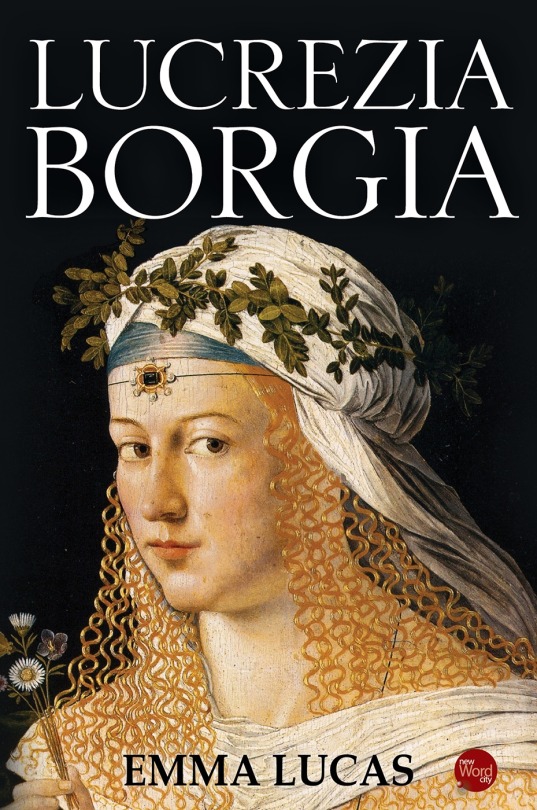
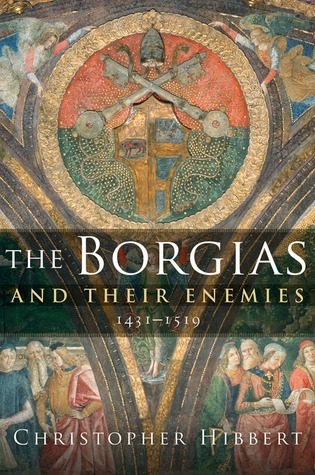
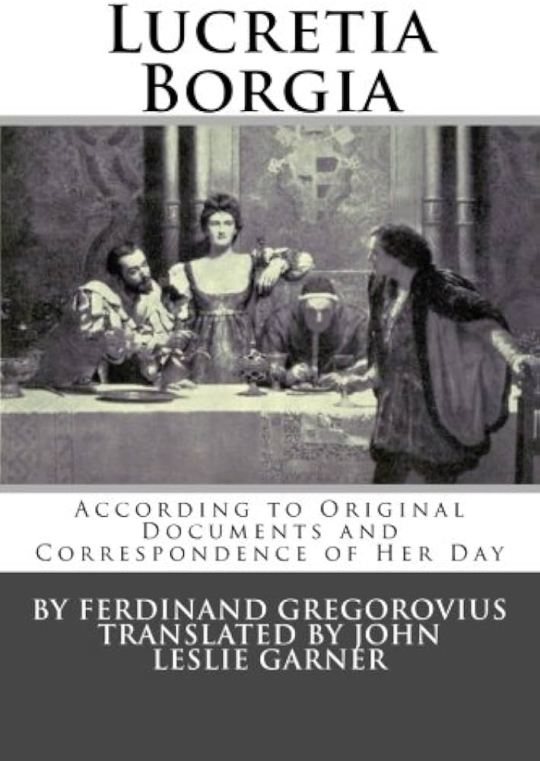
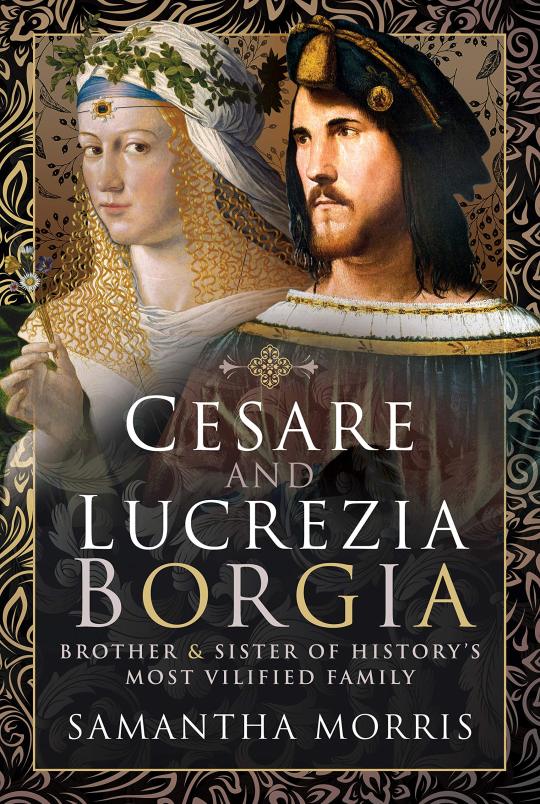
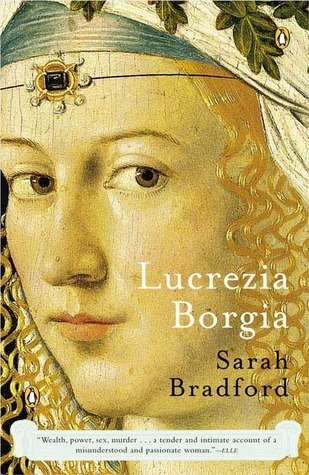
that's all for the biography books! now let's start with historical fiction:
sarah dunant's 'blood and beauty'. one thing about me is that i'm never gonna stop praising this book because it is absolutely my favorite historical fiction book about this extraordinary family! again, i get so invested in any book when the author does extensive research. also, if you're looking for a book about this family that reads like an episode of showtime's 'the borgias,' then this book is your go-to! full of interesting dynamics, and yes, cesare is as cruel and megalomaniacal as history and machiavelli portrayed him, lucrezia as a victim of her father and brother's political ambitions game, and juan as the flawed kid who was eventually sunk deep when he got dragged into his father's ambitions game. while the book doesn't provide a deeper exploration of the characters' psyche, it's more focused on the story by making it very engaging and sheds light on their complex relationships and their rise to power. and every character is highly sympathetic as the author brilliantly humanizes them. in short, it is emotionally intriguing and a must-read for the borgias enjoyers.
mario puzo's 'the family'. you know, i wasn't even surprised a bit that this book's writing and story being groundbreaking because after all, it is written by the author of 'the godfather'. the family is such a compelling book, such tender writing when it comes to lucrezia and cesare. the story becomes intriguing the more you read. i also loved puzo's portrayal of rodrigo as this family man who deeply loves his children yet he uses them as pawns (which is also similar to jeremy irons' portrayal). while i gotta criticize that the characters have no depth and his version of lucrezia as this damsel angel for her father and brother is, uhhh… quite boring. i like her when she's multilayered lol. i also think the way he tried to present cesare and give him the "from zero to hero" trope in order to make him relatable is also lame because cesare's success as a historical figure is because he was calculating and wicked, and definitely not a bitter loser. i mean, i could absolutely ignore the bitterness part, but at least françois arnaud's cesare added so many layers and swag in the characters, therefore you could ignore it. but i can overlook all that when there's an engaging story and great writing, no matter what the characterizations are like. so overall, it's impressive and entertaining, and you will definitely enjoy it.
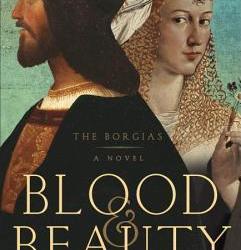
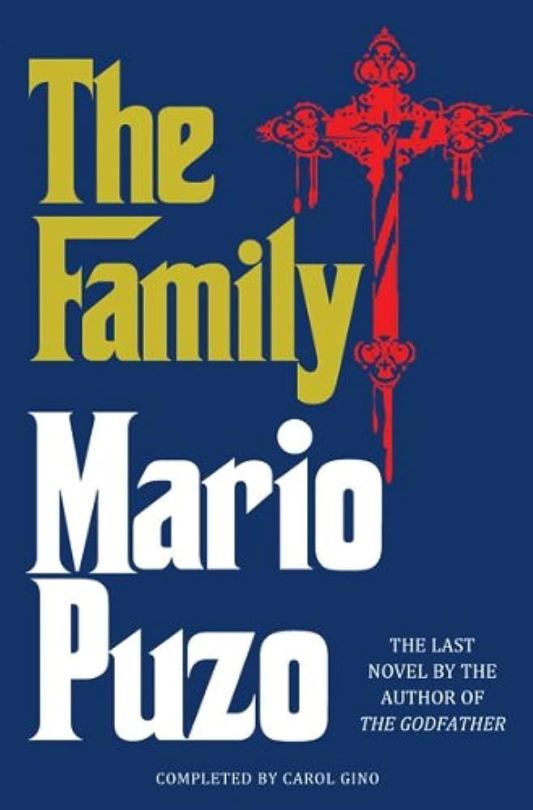
regarding fanfiction; i'm sorry but i never read any because i feel quite satisfied by all 'the borgias' show canon that we have and all these historical books. i wish i could help with recommending fics :/
thank you very much for the question, and i hope this post answers it. have a great day 💕🫶
#silvermars 💌#loved answering this one!#book recommendations#the borgias#biography#historical drama#historical fiction#historical figures#renaissance#house of borgia#lucrezia borgia#cesare borgia#juan borgia#rodrigo borgia#mario puzo#sarah bradford#text post
43 notes
·
View notes
Text
Sapphic Books Reccs
Here is my list of recommended sapphic books! There’s a lot of YA here since that’s a lot of what I read. Everything on this list I have personally read and can recommend. I’m sure there’s a TON out there I haven’t read or ones I have read and have just forgotten!
Contemporary
Astrid Parker Doesn’t Fail by Ashley Herring Blake (Adult)
My favorite of Blake’s! Enemies to lovers. SO good.
Delilah Green Doesn’t Care by Ashley Herring Blake (Adult)
A woman falls for her step-sister’s best friend. Oh, and there’s a kiddo in the mix as well.
The Falling in Love Montage by Ciara Smyth (YA)
Two girls promise a summer of fun full of rom-com worthy dates. The only rule, no relationships. Just one summer, nothing more. Sure....
Forget Me Not by Alyson Derrick (YA)
Amnesia fic where a girl forgets she ever met her secret girlfriend in their ultra-conservative town.
Hani and Ishu’s Guide to Fake Dating by Adiba Jaigirdar (YA)
Fake dating between the girl who wants to validate her bisexuality to her friends and the girl who doesn’t mind the popularity boost.
Her Name in the Sky by Kelly Quindlen (YA)
Best friends to lovers! A big piece of this is also the friend group involved.
Imogen, Obviously by Becky Albertalli (YA)
Imogen thinks she’s just an Ally. Spoiler alert: she’s not. I loved the way friendship was explored in this. You see some really solid friendships as well as a subtly toxic one (that’s acknowledged as such).
Late to the Party by Kelly Quindlen (YA)
An ode to late bloomers and a journey to self-acceptance. A girl goes to her first party, befriends a gay guy who introduces her to new group of friends and one really cute girl
Margo Zimmerman Gets the Girl by Brianna Shrum and Sara Waxelbaum (YA)
Super fun involving a girl asking another girl fo “Queer 101″ lessons. Bi and Autistic rep too!
Perfect on Paper by Sophie Gonzales (YA)
A girl gives anonymous love advice and gets hired by a hot guy to help him get his ex back. Really FANTASTIC bi rep!
One Last Stop by Casey McQuiston (Adult)
A sexy time-bendy romance with so much heart
She Drives Me Crazy by Kelly Quindlen (YA)
My FAVORITE rom-com. I reread it constantly. Fake dating, enemies-to-lovers between the cheer captain and basketball star!!
She Gets the Girl by Rachael Lippincott and Alyson Derrick (YA)
Two girl team up to get their crushes to fall for them and start developing feelings for each other along the way.
Six Times We Almost Kissed by Tess Sharpe (YA)
Childhood frenemies forced to move in together for their best friend moms’ sake. Trauma filled and SO SO good.
Some Girls Do by Jennifer Dugan (YA)
A fun rom-com between an out queer athlete and the local beauty pageant queen.
We Are Okay by Nina LaCour (YA)
One of my favorite books of all time. A story about grief and friendship and love. A soft, quiet story.
Who I Was With Her by Nita Tyndall (YA)
A girl’s secret girlfriend dies and she is left to grieve alone until she finds herself turning to her girlfriend’s ex.
Science Fiction/Fantasy
Crier’s War by Nina Varela (YA)
A romance that leads to revolution by between two girls: one human, one Made
The Once and Future Witches by Alix E. Harrow (Adult)
This is historical and fantasy! Suffragette witches! Another one of those books I wish I could read again for the first time. Three sisters, one of them has a WLW romance
Thriller/Horror
Hide by Kiersten White (Adult)
A high-stakes hide and seek competition in an abandoned amusement park. One of my all-over favorite books of 2022.
House of Hollow by Krystal Sutherland (YA)
No wlw romance in this one, but the main character and her sister are both wlw. My absolute favorite book of 2021. What I would pay to read this for the first time again.
The Girls I’ve Been by Tess Sharpe (YA)
The daughter of a con artist is finally allowed to stop running and faking her identity, only to get stuck in a bank heist with her ex-boyfriend and current girlfriend.
Sawkill Girls by Claire Legrand (YA)
Three girls who shouldn’t have a reason to team up together against an ancient evil. The new girl, the pariah, and the queen bee who’s been helping the evil all along. I have reread this book easy a dozen times.
Throwaway Girls by Andrea Contos (YA)
When a girl goes searching for her missing best friend, she finds a trail of other missing girls and battles with heartbreak after her girlfriend leaves her for California.
Wilder Girls by Rory Power (YA)
Quarantined at her girl’s school after a gruseome Tox breaks out, a girl must find what happened to her best friend who’s gone missing
Historical
Great or Nothing by Joy McCullough, Caroline Tung Richmond, Tess Sharpe, and Jessica Spotswood (YA)
The queer Little Women retelling we all deserve with a SAPPHIC JO! Set in 1942. Beth’s POV still haunts my heart
A Great and Terrible Beauty by Libba Bray (YA)
Two of the major supporting characters are WLW. This becomes more important and on the page in the later books in this series, but this is the first one.
Music from Another World by Robin Talley (YA)
1970s California. Two girls become penpals and bond over music.
The Seven Husbands of Evelyn Hugo by Taylor Jenkins Reid (Adult)
Hollywood icon Evelyn Hugo famously had seven husbands. This is the story of her wife.
256 notes
·
View notes
Text
Clone High: It's About the Contrast
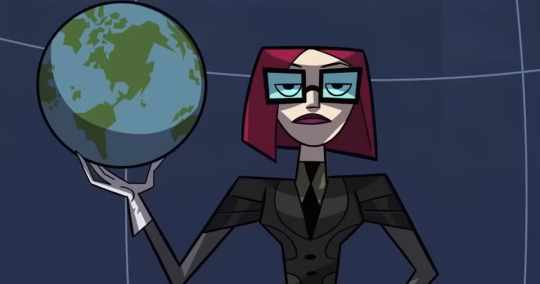
Something I've seen a lot of is Clone High S2 redesigns. People taking the new characters of S2 of Clone High and changing the designs, usually cause they don't like what we did get. Some of these are neat. I saw one that tries to combine their new designs with their S1 designs from when these characters were incidentals. A lot of them seem to take the personality out of the design. Most of them look hard to animate, but that isn't the point I'm trying to make.
People seem to really dislike these new designs. There are valid design reasons (some are a bit overdesigned, and they definitely clash with the S1 designs) but it just seems people are mad at them in concept. Especially Harriet Tubman. How could they turn Harriet Tubman into... this?
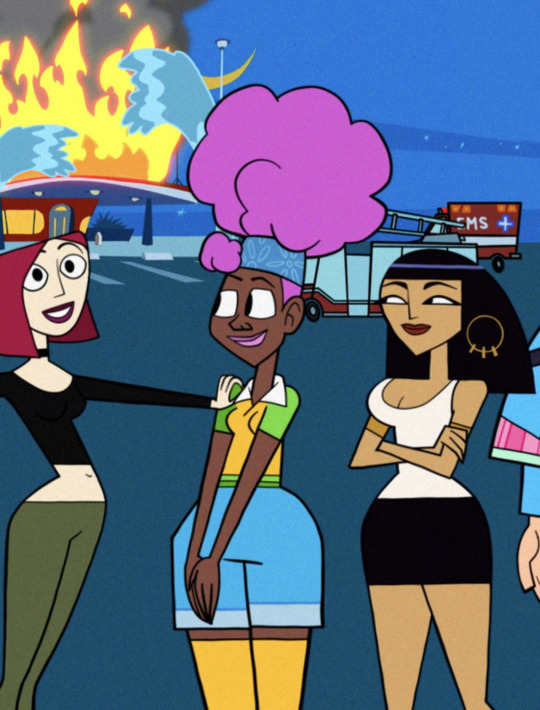
It's outrageous! And yeah, it is. It's supposed to be. That's the joke. In the 20 years since Season 1, the Clone High Fandom has grown and shipped and gossiped and a lot of people have forgotten that the incongruity of the characters is part of the joke. Joan of Arc was not in fact a goth girl who constantly thirsts over tall men. The same goes for several other characters.
Harriet Tubman isn't Harriet Tubman. She shares her DNA but she is decidedly a different person. That's the point of Clone High, the show is less about historical figures interacting in a high school setting and more about how these people might be if they were raised under different circumstances. Ideologically, Clone High is an argument against great man theory.
Gandhi changed the world. But when he isn't born and raised in British controlled India under very specific circumstances, he's just some guy. The same goes for Cleopatra, JFK, Joan of Arc,, Jesus Christ, and yes, even Confucius, Frida Kahlo, and Harriet Tubman. It's circumstances that create people, not people making the circumstances.
Imagine if you had the chance to have a conversation with the real Harriet Tubman. What do you think she would say? How would she act? I'm sure she'd probably be an interesting and nice person, but she wouldn't be a character fit for a wacky animated sitcom. You don't really expect former slaves to be bubbly like that.
It both literally and metaphorically takes the basic DNA of these figures and subverts and modifies their existence through modern society, or rather the tropes of teen dramas. Not just asking what would happen if these people were in high school but if they were ordinary people. Instead of being a hero whose life is in danger, Harriet Tubman is a girl who gossips and whose biggest worry is becoming a basic bitch.
Look at the S2 finale. The board of shadowy figures have assembled their great men and put them in competition. They'll weed out the best of the best to become the great men of the future. And out of about 100 clones, only one actually makes it to the end. Everyone else fails. The one clone who does make it, Joan, is born again into extreme circumstances. Being left for dead by her friends and suffering a psychic break. There is no such thing as great men, just extraordinary situations.
I think this theme of subverting these legendary figures is something that should be kept in mind when talking about the show. It isn't really a show about historical figures, just historically-themed characters. And that's okay. It's very funny when done well! It's a cartoon and it really acts like it. It was never asking to be taken as a serious drama and definitely wasn't asking to be a commentary on historical figures. It simply parodied its contemporary teen dramas a little too well and we got invested in joke characters and everything changed. The S2 writers were in a very unenviable place, and I applaud them for taking things in bold new directions. If you haven't watched S2 or even just watched a few episodes, I'd recommend giving it another chance. It's not perfect but it gets better as it continues. It has its own distinct feel and style while still understanding what "the point" of the original was.
Also Kahlopatra for life ❤️ 🧡 💛 💚 💙 💜

190 notes
·
View notes
Text
After watching Furiosa last night, I was struck by an interesting question with regards to gender roles as they're portrayed in the film's Wasteland. What follows is an attempt to talk about that. Some mild spoilers for the film, but since it's a prequel to Fury Road, it's mostly stuff that's a foregone conclusion.
First I'd like to take a moment to discuss gender, and being transgender. Gender is almost universally agreed on (by those qualified to have input) as a social construct: that is. gender does not exist outside of human thought, and is a set of behaviours and characteristics that we associate and reinforce with each other and ourselves. In most cultures, there are at least two genders: a masculine one and a feminine one. Many others also exist historically and today, as I'm sure you're aware! They are categories we, as humans, have devised and apply to people.
Gender is, essentially, two things. It's what you believe about yourself, and the way you perform in front of others - and the conclusions you make about other people. These are entangled! My idea of femininity as it applies to myself, a transgender woman, also affects the way I view femininity in other people.
It's also necessary I think to briefly talk about sex. To put it neutrally: sex is a cluster of properties that support your anatomy. This can include your genetic karyotype, your dominant sex hormone, your primary and secondary sexual characteristics and many other things. It is not a binary. In humans specifically there are two distinct 'poles' of sex, and a very large spectrum inbetween. No one living corresponds to either pole. They are hypothetical. This is because biology is messy and inconsistent!
Then there's being transgender. In a modern, western context this refers to living a gender role different to the one you were assumed ("assigned") to be at birth based on a doctor's judgement about the appearance of your primary sexual characteristics. Thus you get people born men who live as women, people born women who live as men, and those who live as neither, both, or something else entirely. All these identities are completely valid, because gender is something we create, perform and enforce.
Finally, it needs saying that gender roles vary depending on your culture, and even within cultures will vary over time. Aboriginal peoples recognise 'brotherboys' and 'sistergirls' that overlap with but are not exactly the same as our western notion of trans men and trans women, to name one example.
Okay, got all that?
So, Furiosa is trans.
And this is why I wanted to explain all that up front, because when I say she's trans, I am not saying she's a trans man or a trans woman in the way we would understand that today.
At the start of the film we see a young Furiosa living among her people (her culture) the Vuvalini. They are implied to be matriarchal from statements given in both films. This culture, then, has ideas of gender roles that would be alien to us viewers, and indeed are shown to be different from those elsewhere in the Wasteland. The first non-Vuvalini woman shown in the film is a sex slave. The second is a raider who forces others to see her as equal to men. The Immortan Joe, living in the Citadel, maintains the status of women under his rule as Breeders or Milkers - else they are cast out to the masses below.
Furiosa finds her way into Joe's hands as a child, and because of the way Joe views gender (and sex), is designated a Breeder-to-Be. However, she escapes this fate and disguises herself as a War Boy. She lives in this manner for the next six years, hiding her sex and performing a 'masculine' gender role (which is, fittingly, closer to how she lived as a child among the Vuvalini). A scene during the construction of the Chrome War Rig shows that she specifically goes to urinate alone so that people would not discover her as a 'girl' (behaviour noted as unusual and a little suspicious by one of the Blackthumbs).
She is later revealed to be a woman by Praetor Jack, but for whatever reason this does not bother him (reading between the lines, it's implied that Jack is not a native of the Citadel, and so was probably raised with different ideas of gender than his War Boys). He takes on Furiosa as his apprentice, with Joe's blessing - her status as a woman is now public and known, but she has already performed as a man, so she is perceived as a man. From here on, no one in the film draws attention to her femininity or thinks her lesser for it: she is held as an equal to any of the men of the Wasteland.
This is why I say that she's trans. She is a woman, she does not appear to be dysphoric about being a woman, and among the Vuvalini she would very much be seen as cisgender - but to the people of the larger Wasteland, and the culture of the Citadel specifically, she does not perform the gender roles allowed to women.
I wanted to write about this because it's interesting to me as a way of illustrating gender not just as your internal identity, but as a label applied to you by other people. Nothing in the film implies that Furiosa would ever consider herself a man. She is fiercely proud of her heritage! But she does see herself as different from the Wives, while seeing herself as no different to Praetor Jack.
So when I say "Furiosa is trans", it's actually a subjective statement: Furiosa is trans when she's living in the Citadel, but not when she was a child or after the events of Fury Road when she's killed Immortan Joe and ruling in his stead. The nature of being trans is, pardon the pun, transient, because we can only really be trans when other people perceive us to be! While I wear the label 'trans woman' with some pride, I only do this because society expects me to distinguish myself from those 'born' women. For trans women who pass well enough to live in 'stealth', the label doesn't need to be stated: society sees her as a woman - she is a woman.
It makes me wonder: in another time and place, if I behaved and performed exactly the same way I do now, would I be trans, or would my gender role be considered within the acceptable ones for my perceived sex?
I don't know, but it's fascinating to think about.
#deafmangoes#transgender#transgender philosophy#trans#furiosa#furiosa a mad max saga#furiosa spoilers#spoilers#philosophical rambling
49 notes
·
View notes
Text
Black Mirror’s Demon 79 and the Justification of Brown Feminine Rage (warning: spoilers)
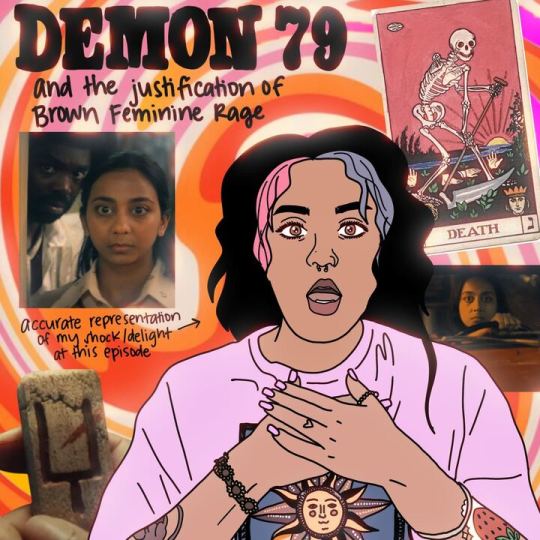
What if intrusive thoughts can be valid, and it is okay, maybe even necessary to act on them sometimes? If violence isn’t the answer, why must it so often be the question?
Set in Northern England, 1979, “Demon 79″ is the final episode of Black Mirror’s sixth season. It follows Nida, a meek sales assistant with a mousy appearance, who is tasked with the most complicated and important mission: to save the world by taking the lives of three human sacrifices in the days leading up to May Day.
Champions of the extended metaphor, Black Mirror employ the talents of Anjana Vasan (an Indian-born, Singaporean-raised, and U.K.-based actress) who plays Nida Huq and Paapa Essiedu (an English actor of Ghanaian descent) who plays Gaap*, the demon Nida accidentally invokes upon finding a talisman that begins this stressful mission of her. Gaap, devilishly handsome and charming, trying to earn his “wings” and be initiated into demonhood reassures the panicking Nida that she is not going mad, she is not a bad person, and the people she is encouraged to kill are vetted through his soul-reading as deserving of death.
*Gaap is considered through stories of demonology and texts related to the Testament of Solomon to be the Prince of Hell, with angels as siblings and a penchant for manipulating women and rendering them infertile.

Gaap adjusts his form to something more comfortable for Nida by changing into a look-a-like of Bobby Farrell from the famous disco-funk German-Caribbean vocal group known as Boney M. Having the representation of a demonic entity be a Black man while allowing him to manifest into a symbol of appeal for Nida turns the inherent vilification of Black men on its head without contributing to the hypersexualization of Black bodies. Gaap is never presented as a love interest for her, but viewers do get to see them develop a snarky back-and-forth. I almost never see Black and brown leads banter like this.
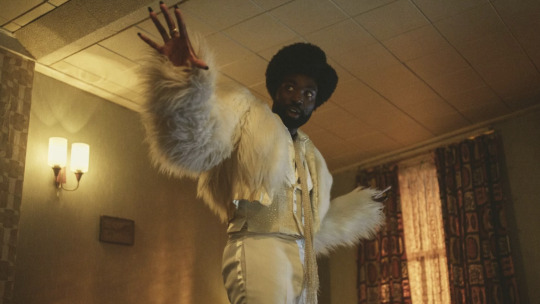
Another reason I’m glad Gaap was not portrayed as a sinful symbol of sexual desire is because Indian women already have to navigate a shame-fueled purity culture, and I wouldn’t want to see her grapple with her feelings for someone who is not only outside of her race and religion, but isn’t human. Writers avoided the idea that to love Gaap was to love something forbidden in all possible ways. And we don’t need to see Black folks depicted as not-human. The history of both American cinema and politics has acted on that dangerous perception already.
When I saw the opening scene of Nida with her wide eyes waking up to get ready for work, I recognized the doe-like innocence in her face as the one I have been raised to emulate. She looks so much like my mother 30 years ago. Minimal makeup, modest clothes, hair neat and tied back.
Moments of Nida’s inner demons being unleashed start off as fantasies she has. She is quietly scurrying through her life as an oppressed minority in 1970′s England, where xenophobia and racism showed up everywhere, from the actions of the British Nationalists to the microaggressions Nida faces at work for simply bringing her potent biryanis to the stock room and “stinking up the place”.
Indian women are some of the least visible in politics historically and presently because we are raised to not make a fuss of things, to be quiet and reserved and let white people act how they want towards us because we are guests in their countries, even when they’ve colonized and pillaged our own. I feel Nida’s pain as she thanks the white people around her for the bare minimum (allowing her an alternative place to eat, such as the basement - where she finds the talisman that changes her life) and avoids the confrontation and rage within her, even sighing in defeat at the NF* tag that has been spray-painted on her front door.
*NF stands for the National Front, a far-right, fascist political party in the United Kingdom, founded in 1967.
I crave catharsis for Nida. And for her late mother, whom she has a photo of in her apartment. She explains after the first sacrifice that her mother was perceived as crazy, and now Nida is afraid that people will think the same of her, and this time, because of what she’s done, it will be true. I wondered if Nida’s mom was called crazy because she had stood up for herself, reported abuse or harassment that was occurring within the Indian community itself or in her own home, or tried to leave Nida’s father. None of these scenarios would make the show seem like fiction at all, at least not for many of the South Asian women trapped by the chains of patriarchal ideals.
There are moments where I am concerned Nida is enamored by Michael Smart, a white politician giving a campaign speech outside the store she works at, as if his mere acknowledgment of her existence without visible disgust is enough to make her heart flutter. Again, I enjoy seeing a Black and brown lead in this episode, and knowing that other viewers are getting to see the many instances of white culture that exposes the racist ignorance and unfair power structures that exist in western society, workplaces, and even the homes of white folks themselves. (I was so happy for little Laura to hear of what was done to her assailant).
When it comes to stopping the world from absolute destruction in a nuclear holocaust, the heroes have never really been people who look like Nida. (It is worth noting that the head writer for this episode was Bisha K. Ali, who also is the executive writer for Disney+’s Ms. Marvel and has tackled many of the same representation issues in her work). People like her don’t have the permission to be loud, angry, or violent without consequences, no matter how justified. Meanwhile, with unchecked authority, bombs go off and innocent people die and children cower in their beds and white men get to act on their worst traits and impulses, however sinful, with little to no accountability.
Even when Nida is being violent, it is for the greater good. Because it has to be. Even female rage has to serve a purpose for others. It cannot just be hers. If she’s going to be angry, she better be trying to solve crime or save the world.
And through this most guttural and sometimes poisonous part of being a human, Gaap sees her. Maybe it’s because he has transformed in the image of Nida’s celebrity crush or maybe it’s truly the way in which he interacts with her, Gaap sees Nida. He recognizes the type of violence she would and would not indulge in. He tells her she should feel more at ease after killing the first sacrifice, a pedophile she clobbers with a brick before he falls into a river. He continuously recognizes her hesitation, and suggests “Dutch courage”, or booze before following through with the second kill. It is inappropriate in Indian culture for women to drink, which Nida notes when she tells Gaap she doesn’t. Then he asks her if she wants to, something, from the expression on Nida’s face, it doesn’t seem like she has ever been asked.
Upon entering a pub full of (yes, all white) men, Nida is dismissed by the (also white) female bartender who looks just as irritated by her existence as her coworker Vicky, who had reported how unfair it was that she had to smell Nida’s lunches and endure the lingering scent at work. An older (also white) bartender (who might be the owner) takes her order with the same polite and quiet discomfort of her boss, who had presented her with the basement lunch “solution” to appease Vicky. It’s subtle but the approaches in which different age groups and genders of white English folk take with engaging with Nida demonstrate the variety of ways in which people of colour experience discrimination. At its worst, it is violent hate crimes and unjust legislation that mutates into full blown genocide. At its mildest, it’s passive aggression and strained tolerance.

It’s more apparent with the second killing (of a man named Keith who killed his wife) that Nida does have the option to be as righteous as she wants to be, which is something I really appreciated about her character. Even if she was killing to prevent the literal apocalypse, and the clock was 6 minutes from midnight -- she must follow the cadence of at least one kill a day -- the moment she has to hear Keith’s justification for what he did and his attempt at absolving himself with the statement “I’m not a bad husband, but --” she swings a hammer at his head to shut him up. She then bashes his head in repeatedly, even to the point where Gaap is wincing at the sight. If this was just about killing people to stop a bigger disaster and loss of life, she wouldn’t be losing herself in the act like she did.
The third and final kill occurred in the next few minutes, as Keith’s roommate, witnesses her trying to exit, which presents itself as problem in allowing her to continue with the mission if she’s arrested. It’s messy because it was fast, the least premeditated, and she doesn’t know who the man is or if he’d done anything as bad as the previous two skills. Because of this, she’s much more apologetic as the man dies, later finding out from Gaap he was Keith’s brother, Chris, an “ordinary” person who would not have been one of Nida’s choices.
But as Gaap says, “What’s done is done”. And the three lines on the talisman should have disappeared indicating that Nida has fulfilled her duty. But it still has a line remaining, so a confused Gaap dials 666 (of course) on Nida’s rotary phone to explain the issue to his superiors. He tells Nida that Keith apparently didn’t count because he’s a murderer and anyone who’s been directly responsible for the death of another human being (not counting future deaths they might be responsible for) is off limits. Chris counted because his death still occurred just before midnight.
Nida doesn’t snap psychologically and decide she enjoys this and is going to become a serial killer, which is a direction I find common in other Black Mirror episodes, where the white and/or male character loses it and/or goes on a killing spree. She grapples once more with her initial unwillingness to participate in this because even when given the go-ahead and to have the most reason to, she enters a mental boxing ring with her instinct v. culture v. morals. From my own experience and what I have seen in my own community, outward expression of rage is never the first emotion a woman reaches for...because she can’t always afford to in the way others can.
“My whole life, I never wished harm on anyone.”
Gaap tells her what’s at risk for him, and he describes a fate of punishment that she says sounds like her life now. She stands, empathizing with an actual demon, and deciding to continue with the mission. Gaap also reminds her this isn’t solely for him; she possessed a darkness within her that drew her to the talisman. So, he asks her, who pissed her off?
To Possette’s Shoes they go.
Vicky, a prime choice for the grand finale, delegates the task of attending to the young girl Laura (from earlier) and her mother to Nida. Because the little girl creeps Vicky out. Gaap informs Nida that because she killed Laura’s dad, Laura doesn’t kill herself at 28 and instead goes to therapy, becomes a mother at 29, and a grandmother at 57. It’s a comforting thought amidst the mayhem of it all.
Michael Smart makes an appearance once more, as his father and the boss’s father, are old college friends, and Nida’s boss had promised him a suit and shoes on the house. The boss unsurprisingly selects Vicky as the sales attendant, with Gaap grumbling to himself as Nida’s eyes go from ‘excited crush’ to just crushed. Her boss then chooses to notice the boxes on the floor from when Vicky could’ve been cleaning up and hisses at Nida, “Could you pick up the bloody mess?” This prompts Gaap to suggest the boss be the next to go.
Nida moves on to cleaning up the boxes, eavesdropping on the conversation between Michael and Vicky. When Michael says he hopes he has her vote, she says she is siding with the National Front who she believes will help rid the town of all the pesky foreigners. And then Michael Smart reveals himself to be what a lot of politicians are: covert bigots. He explains to Vicky that an explicitly xenophobic campaign would be too polarizing, so you have to elect a moderate who can win over the masses and put the evil plans in motion. (Sound familiar?)
There is a subliminal language spoken among white supremacists, even if they smile politely at people who look like me and Nida. And this revelation that she witnesses presents an even more justifiable option for Nida’s third kill.
She asks Gaap to give her information about Michael’s future, which he hesitantly reveals to her. Michael Smart wins the election, eventually becomes prime minister, and leads a new world order built on white supremacy. Nida decides he is the final target, but Gaap tells her he wouldn’t be the right choice because the Satanic world he comes from is a fan of his work and everyone there would want Michael to be able to facilitate the upcoming deaths that occur as a result of him first winning the election to become a member of Parliament.
But Nida is set on him, or no one, giving Gaap the ultimatum to get on board or risk his own banishment after failing his initiation.
Meanwhile, a police investigation occurs which leads to the bar staff identifying Nida as a “muttering Indian woman” who was at the bar the night Keith died. Len Fisher of Tipley Police arrives at Nida’s apartment, as part of routine questioning, and she invites him in, with Gaap’s suggestion to kill him.
Fisher is the first white person to speak to her as person, too, even though he’s there on the premise of Nida being a potential suspect. Maybe this is more covert trust-building behaviour, maybe as a cop, maybe as someone generally suspicious of people of colour. He is the most mild-mannered, middle-man in the whole story.
Fisher follows Nida who follows Smart after his speech at town hall. This is where I’m a little surprised but not displeased. The other episodes end with something sad, violent, and/or redemptive. Nida gets a bit of everything, but as with all things Black Mirror, not in the way you’d expect. In society, Nida may be reduced to a mad woman telling an insensible story, enduring the same perception people had of her mother. But society doesn’t last long, and she walks off into a kind of nuclear, fiery sunset with a new friend.
The deadline for the sacrifices had been May Day, also known as Workers’ Day or International Workers’ Day to commemorate the struggles and gains made by workers and the labour movement. Nida, representing intersectional identities of the working class (immigrants, women, people of colour), was not listened to or believed, and the world ended because of it. Her weapon of choice had been a hammer, a tool meant for building that was used for destructive but necessary purposes. This could be a reference to the Communist party’s symbol of a hammer and sickle, which represents proletarian solidarity. The meaning of the episode, particularly its ending, captures the significance of the working class and how our world relies on them to function and last. When their efforts are stunted, their sacrifices are in vain, or they are not heard, the world ends.
#black mirror#demon 79#tv series review#black mirror season 6#paapa essiedu#digital illustration#fanart#commissions open#anjana vasan
274 notes
·
View notes
Text
Fandomry tips on hcs.
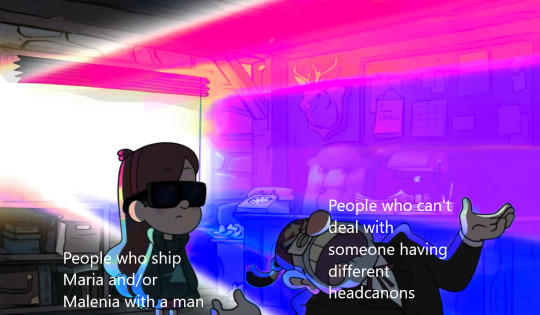
I've met another user that was afraid to share their cool Maria story ideas out of fear that they'll get shunned as "hating masculine lesbians", so, just a few things:
1) No matter how popular a headcanon is, it doesn't become canon. Fandoms do not abide by majority rule in which you could never have an unpopular idea.
2) With LGBT+ headcanons, the less you justify them - the better. The rude minority might think that Maria "has" to be a lesbian because her hunter outfit resembles male Knight garb and she cares about a female friend, and everyone who disagrees "lack media literacy" and "has bias". What is it trying to say? That bi or straight women could not look masculine? That the only reason a woman would ever dress masculine is to be the 'man' for her femme? Or that women could not care about other women deeply unless they're attracted to them? Even "historical accuracy" excuse is obsolete, because Bloodborne clearly doesn't abide by real world's history Victorian antics. Female vicars/doctors/hunters and people of color being equal to white people is a dead give-away to that.
It is even more confusing with Malenia, who doesn't even look masculine. Not feminine, either. She looks like 'just a person'. So what makes her "canonically a lesbian"? The fact that she is a strong fearsome warrior? Why? Because bi or straight women would not fight but instead latch onto some guy to protect them...?
You see what I mean. Justifications for why an interpretation HAS to be one thing and not the other only make things worse and push people into very narrow, at times outright offensive stereotypes. 'She is this because I think so' is a good enough reason - and that's where you can see that someone else's thoughts will be JUST as valid!
3) Headcanons and fandomry are not activism. No minority will be effected just because in some fandom people ship some character in some ship. EVER. These things are for FUN, lesbians aren't fairies within which one dies every time you say "I don't headcanon X character as a lesbian". What do you think will happen if many, or even majority of people like bi (or even straight) headcanon instead of lesbian? A life essence of a whole demographics will be dried out?
4) "It is not that hard" is not an argument. It is never anyone's business why someone would deny a very inviting opportunity for a headcanon. Freedom and autonomy is the VERY base of having fun in the fandom. In fact, very often, it is this same toxic attitude what makes average users NOT want to celebrate a strong female character as a lesbian. Because they feel like they had no choice! And many people possess contradictory spirit, that might make them choose something as affirmation that they won't be mocked into thinking a certain way.
_______________
Honestly, it is NOT okay that here and there people have to feel afraid to do something as innocent as to share their ideas, and might just end up leaving an interesting character aside because loud and rude people scared them away. Do not let a character you like get "claimed" by some group just because they were the meanest, do not hide your awesome ideas but instead post them and TAG them. Fandoms are free spaces, not a middle school where the popular girls set the trends and decide who gets to be bullied.
And if some people can no longer enjoy a fandom or a character because other people got a different headcanon? Well, then they were not built to be in fandom spaces to begin with.
#fandomry rambles#bloodborne#lady maria of the astral clocktower#elden ring#malenia blade of miquella#i mean what i saw yesterday was not as bad as a pointer from a friend regarding 'shipped with a man'#but it still was bothersome#naturally all this applies to MLM enjoyers that hiss at every woman in 10 yards distance from-#-a male character they headcanon as gay#i just do not have consistent examples of that#i know like one person was mad at people not seeing how g3hrman was canonically gay#and even that was half-serious and reaction at haters calling him cishet 'when he loves laurence' xd#really not threatening aura
154 notes
·
View notes
Note
hello! we hope this is ok to ask, it's totally fine if you don't answer- but we've recently become interested in satanism and demon work, but we know exactly nothing about it or where to start. we did some basic research with academic sources like wikipedia but have no idea where to go from there. we're hesitant to just dive in on our own because we know there are a lot of bad sources and groups to avoid but don't actually know what those things are.
anyways, we trust your opinion and recommendations so we wanted to ask if you had any suggestions on how to go about researching and learning about theistic satanism for an absolute beginner! recommended books or articles, groups to avoid, red flags, anything like that would be very appreciated 💚 thank you so much!
okay so, this may be a controversial opinion but in my opinion (KEY WORD OPINION) you actually shouldn't only stick to unproblematic and valid uwu authors, because i'll be honest (in terms of satanism and demonolatry), there ARE no pure and good authors out there. every author out there, especially if you're reading a text from a long time ago, is going to have something you disagree with. you need to practice some form of critical engagement, additionally, because engaging with a text critically and understanding why it is wrong is way more important than just shutting out the information altogether. you will not learn anything if you pretend that problematic texts do not exist. i'm not saying this to be harsh, but there is a reason we research a variety of texts and perspectives in high school english class. you need to continue that kind of method when researching anything.
now that is covered, i'll tell you what i have read personally. taking the above into consideration, there are no authors here that don't have something deeply wrong about their texts. i did read their works, and i came to my own conclusions on whether i'm going to dub them an authority on satanism, and i suggest you do the same. satanism is about knowledge and drawing your own, unique conclusions. just make sure what you do adopt doesn't throw any groups of people under the bus, because we're not here to read books and thoughtlessly believe whatever the book says, especially when the book can have misinformation, or offensive content. this is very common in satanism; as much as people love to treat it like it's revolutionary and all-accepting, it can be just as, or even more, discriminatory or outright hateful as christianity, especially in the texts.
the most easy-to-find material:
ars goetia > pretty basic info, but very handy and simple to read
the infernal gospel > probably my favourite book on this list
the complete book of demonolatry > i don't agree with the author, but i got this one in my early days before i knew anything about said author. it's got some useful information, but there's a lot of misinfo
book of the fallen > useful rituals if i remember correctly, i sold this book so i can't recheck
at satan's altar > also an interesting book
the goetia devils > has a lot of what i assume is upg... seems to conflict with what i've seen from other practitioners
the goetic hymns > second favourite book
the satanic philosopher > i found this one hard to read personally
esoterica > youtube channel with amazing information on demonolatry and its history, i suggest getting into this before doing anything else.
all of these websites.
and lastly, i also got like 50+ older texts i got as a bundle off etsy that i can't remember the names of. i wish i could give them to you, but i genuinely have lost every single text i got in the bundle due to me changing computers. i suggest looking on etsy for similar bundles on satanism and demonolatry if you want to get into the historical meat of things.
that being said, my actual last thing i want to say is not to get too entrenched into the theory. the texts are handy, sure! but the one thing i have found the most useful is by engaging with the community. most of my wealth of knowledge did NOT come from texts or media, it came from those around me talking about their experiences. if you want to learn, and i mean REALLY learn about demons and satan, get into the community hardcore and you will learn something new every day. talk to people, make friends, don't do this alone.
edit: okay one more thing. this does go against what i was saying to some degree but i do have a limit to that logic. avoid joy of satan. they're n/eonazis and come on this website regularly. avoid them, avoid them, avoid them.
#bun talks#theistic satanism#demonolatry#satanism#i wanted to write more but i'm admittedly on a time crunch :(
19 notes
·
View notes
Note
Is Latino not an ethnicity????
It isn't (and it isn't a race either). Latinidad is a political identity with some sociological, cultural and historical background. What it does not have -and I cannot stress this enough- is shared genetics/common ancestry which is how I see it most referred.
Here's the definition of ethnicity from Wikipedia:
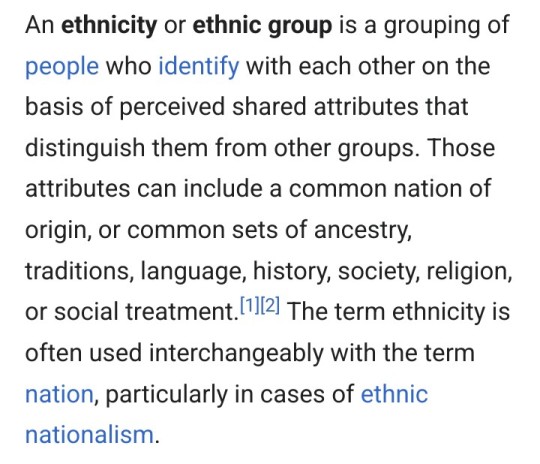
And to use roughly the same source, here's the Wikipedia disaggregation of Latin America today (which ofc I have issues with lol I'm not missing the irony of telling you "Latin America is sooo diverse" while using the "Asian" category, but I need to make do:
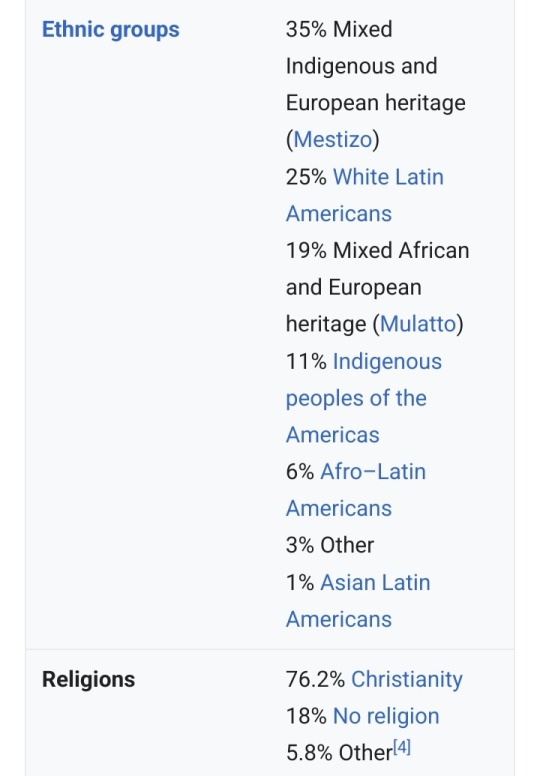
See what I'm getting at?
Let's continue, you can say "well I didn't mean genetics, I meant everything else"
Okay language:
Latin America includes hundreds of native languages like Quechua, Mayan, Guaraní (oficial language of Paraguay!), Aymará or Nahuatl, and always has! Without counting the beautifully mixed and improved Spanish, Portuguese (which I called Brasilero for years as a kid lol) and French, or even later additions like Welsh, Japanese, Chinese or Arabic from immigrant clusters that still speak it or are currently arriving into the continent.
So language isn't it either.
I don't even need to get into traditions c'mon look at Carnaval in Brasil, día de los muertos in Ecuador, an 9 de julio in Argentina and tell me those are all the same. Look at empanadas, tacos, humitas, pizza brasilera, tequeños, asado, sudados, etc
Religion? Argentina alone has the second biggest Islamic and Jewish populations in America after the US. Sure Christianity is paramount given the invasion and imposition by Catholic monarchies by the Spanish and Portuguese, but to say it's the only religion is to spit in the face of again, hundreds of native people's whose religions have been systematically erased since 1492. It is also quite reductive to only take institutionalised religions as valid forms of worship, or to ignore the fact that most Catholicism here would give European orthodox Catholics a stroke.
Now, history and social treatment, here's where the good stuff is.
Independencias:

These all look super different but these are processes and most of them took place in the first 3 decades of the 1800s so they're not that far off. These were carried out with an idea of hermandad. They used to be virreynatos under the same rule, we (patriotas) were all getting independence from the same monarch power (realistas). There was a lot of collaboration between administrations and armies. This was a decision from the leaders of the time, to seek strength in numbers.
The fact that we had to gain independence is a point of contact as well. At that time "patria" was understood as the desire to be independent, there were no neat lines to separate the territories. At this point in history you'll find lots of key people like San Martín, Juana Azurduy and Bolivar talking about "pueblos americanos" as a way to claim independence from imperialist/colonial European rule. (Brasil had a different history with the Portuguese court moving there)
The term Latin America or Latinoamérica came by a little later, the earliest it's been found used is 1856 by a politician from Chile, as you can see, the context it is used in is purely political.
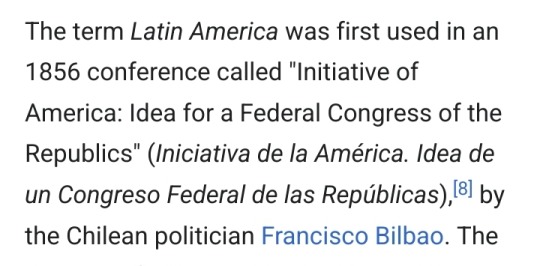
Historically, the term when used by Americans is heavily tied to a way to gather strength in solidarity for independence and rejection of foreign imperialist aspirations, from the United States, France, Spain, etc etc.
I think latinidad is in a way a self fulfilled prophecy, we were invaded and as such "unified" where before were hundreds of different peoples. We took that very same unification and made it ours, in part because the rest of the world insists on putting us all in the same bag (included with things like the School of the Americas in the 1960s-1980s where all of Latinamerica was deemed safer for the US to be ruled by genocidal military governments than democracies that smelled just a little communist. Spoiler! it wasn't safer for us who had to actually live under them)
I reject the idea of latinidad as an ethnicity because it stems from the idea of "la raza latina" which is very very racist ("latinos" were the white Europeans from Romance language countries aka Spain, Portugal, France and Italy, there was a clear hierarchy there usual to the era that still affects our social and economic framework). It's reductive and it pretends to obscure and muddle a very clear and deliberate political choice that is to identify as latinoamerican.
This also applies to the latin people who emigrate to the US and their descendants, both the ones fixing the lawns and the ones emigrating without need of a visa to work a stable 9-5. Even if it seems only the first ones get the name.
So what's latinidad? It's whatever we say it is, hope this helps ✌️
#asks#anon#i do wonder what brought the question on lol#mmine#america latina#latam#i rewrote this a million times#and it isn't even close to comprehensive but it is what it is#you'd need ten years of study to even begin to grasp latinidad if you don't have a life of it
50 notes
·
View notes
Text
I think that gatekeeping criticism is weird. And in the coming months, the narrative is going to devolve to blaming anyone who criticized the show for the finale for every reaction to it the showrunners and DJ make. I’m sure there are some bad actors who are harassing them, but isn’t it possible they’re just seeing the criticism on their own and responding to it? Like… that’s the risk you run when you are at the head of a popular show with a big fandom. And the criticism is mostly valid. The CONSTRUCTION of that episode was a MESS. This isn’t a mob of marvel bros angry that they woke-ified an avenger or something (can you tell I don’t know anything about Marvel…) This is constructive feedback. If you’re working under the constraints of a slashed budget, THIS is what would work for us as fans better. THIS is something we can sacrifice in order to lend more time and gravity to THIS.
This is a show that has historically taken its fans’ thoughts and feeling into consideration. What’s changed? Other than that some you are terrified they can’t handle it? Or that it will somehow result in not getting us a third season? It’s okay to be anxious. But don’t gatekeep my criticism. Because BOY DO I HAVE SOME. And when you work in a creative space such as television, you only grow from experiencing it now and then.
Nobody should be harassing the creators of the thing they enjoy. But don’t assume that anyone criticizing the show is pointedly harassing anyone. Or even adding to that fire. Some of us literally just have tumblrs and think it’s weird to have a direct line to ANY celebrity you don’t know in person. 🙃
31 notes
·
View notes
Note
Okay, given that you think the show switched around a lot of endings (very valid, to be honest), how likely do you think it is that they gave Tommen Tyrion's ending?
The gargoyles watched him ascend. Their eyes glowed red as hot coals in a brazier. Perhaps once they had been lions, but now they were twisted and grotesque. - Bran IV, AGOT
Stone and shattered gargoyles lay strewn across the yard. They fell just where I did, Bran thought when he saw them. Some of the gargoyles had broken into so many pieces it made him wonder how he was alive at all. - Bran VII, ACOK
Tyrion Lannister was sitting on the ledge above the door to the Great Hall, looking for all the world like a gargoyle. - Jon I, AGOT
Motionless as a gargoyle, Tyrion Lannister hunched on one knee atop a merlon. - Tyrion XIII, ACOK
I am by no means certain about Tyrion's endgame but I just came across these quotes while rereading ACOK and I am intrigued. What do you think?
I completely agree with your observation that George has intentionally connected Tyrion to the gargoyles.
"Yes. The gods have been kind to you, Sansa. You are a lovely girl. It seems almost obscene to squander such sweet innocence on that gargoyle."
"What gargoyle?" Sansa did not understand. - Sansa III, ASOS
But I'm not sure what the takeaway is.
It seems quite probable that Tommen will throw himself from a window in Maegor's Holdfast.
There's the historical parallel:
Yet all these were as naught against the tragedy that descended on the court and king. On the twenty-second day of the ninth moon of 133 AC, Jaehaera of House Targaryen, Queen of the Seven Kingdoms and the last surviving child of King Aegon II, perished at the age of ten. The little queen died just as her mother, Queen Helaena, had, throwing herself from a window in Maegor's Holdfast onto the iron spikes that lined the dry moat below. Impaled through breast and belly, she twisted in agony for half an hour before she could be lifted free, whereupon she passed from this life at once. - Fire & Blood
Plus, throughout A Feast For Crows, George consistently emphasizes the iron spikes whenever Cersei is on the drawbridge:
She paused upon the drawbridge that spanned the dry moat, gazing down at the spikes below. - Cersei I, AFFC
x
She left him on the drawbridge that spanned the dry moat with its bed of iron spikes and entered Maegor's Holdfast alone. - Cersei V, AFFC
x
"Should Ser Loras fall, Your Grace will need to find another worthy for the Kingsguard," Lord Qyburn said as they crossed over the spiked moat that girded Maegor's Holdfast. - Cersei VII, AFFC
Lastly, in the epilogue, Kevan Lannister remarks about the iron spikes, then the text quickly transitions to the lack of available Kingsguard to watch over Tommen:
The dry moat surrounding Maegor's Holdfast was three feet deep in snow, the iron spikes that lined it glistening with frost. The only way in or out of Maegor's was across the drawbridge that spanned that moat. A knight of the Kingsguard was always posted at its far end. Tonight the duty had fallen to Ser Meryn Trant. With Balon Swann hunting the rogue knight Darkstar down in Dorne, Loras Tyrell gravely wounded on Dragonstone, and Jaime vanished in the riverlands, only four of the White Swords remained in King's Landing, and Ser Kevan had thrown Osmund Kettleblack (and his brother Osfryd) into the dungeon within hours of Cersei's confessing that she had taken both men as lovers. That left only Trant, the feeble Boros Blount, and Qyburn's mute monster Robert Strong to protect the young king and royal family. - Epilogue, ADWD
It's not a lot, but it's enough for me. Lol
As much as I'd love for it to be Tyrion, Tommen feels like the safer bet. :)
55 notes
·
View notes